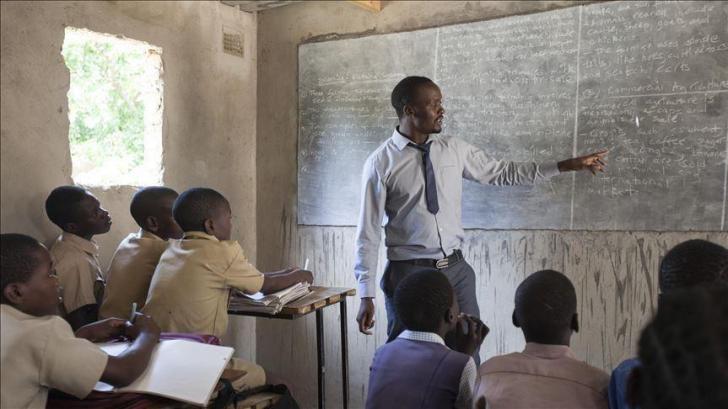News / National
15,00 Zimbabwean teachers dump profession
21 May 2025 at 12:52hrs |
0 Views

Zimbabwe's education sector is reeling from a deepening crisis as teacher unions report a mass exodus of educators, with at least 15,000 leaving the profession annually due to low salaries, poor working conditions, and political interference in schools.
The alarming trend, revealed by the Progressive Teachers Union of Zimbabwe (PTUZ) and the Amalgamated Rural Teachers Union of Zimbabwe (ARTUZ), paints a bleak picture for the future of the country's education system.
PTUZ president Takavafira Zhou said his union has been overwhelmed by reports of teachers retiring early or deserting their posts entirely. He attributed the growing discontent to chronic underpayment and a lack of meaningful engagement by the government.
"We have received many such cases. What is most worrisome is the delay in processing retirement benefits for those who formally retire. Some even die before accessing their packages. The sciences—Mathematics, Physics, Chemistry, Biology, Combined Science and ICT—are the most affected," Zhou told NewsDay.
According to Zhou, approximately 15,000 to 20,000 teachers leave the sector each year through desertion. He said this estimate is supported by data from provincial reports and the Salary Services Bureau, which tracks non-deductible dues from teachers who exit the system.
He accused the government of sidelining educators and imposing unilateral changes without proper consultation.
"There is a general feeling that the government is deliberately punishing teachers. There's minimal space for motivation, innovation, or professional growth. Curricula are imposed without educational prudence or proper resources," he said.
Zhou also highlighted political interference as a key factor driving teachers away. He cited cases where school administrators were suspended for performing their duties professionally or for refusing to bow to political pressure.
"Lessons are regularly disrupted by political events. Schools are ordered to send pupils to rallies, especially when top politicians or their spouses are involved. These disruptions are ignored when performance declines. Schools are no longer safe or professional spaces," he said.
He further lamented a national shift in priorities that sidelines education in favour of informal business dealings, saying the government must focus on harnessing intellect and rewarding teachers fairly.
"Teaching is the mother of all professions. Teachers manage the nation's most important asset—our youth—and must be supported with decent pay and professional freedom," Zhou stressed.
ARTUZ president Obert Masaraure echoed similar concerns, saying his union is inundated with cases of teachers seeking advice on early retirement.
"We now handle up to 50 early retirement requests at any given time. Teachers are tired of this thankless job and are desperate for alternatives," Masaraure said.
He added that many educators are leaving the profession to pursue income-generating projects using their pensions. Masaraure called for urgent and genuine dialogue between the government and teachers to reverse the damaging trend.
"The government must begin engaging with teacher unions to create meaningful reforms and incentives—both monetary and non-monetary—that can restore dignity to the teaching profession," he said.
As of publication, Primary and Secondary Education Ministry spokesperson Taungana Ndoro had not responded to questions on the crisis.
With Zimbabwe's education sector continuing to haemorrhage talent, unions are warning that without urgent intervention, the country risks undermining the very foundation of its development - its human capital.
The alarming trend, revealed by the Progressive Teachers Union of Zimbabwe (PTUZ) and the Amalgamated Rural Teachers Union of Zimbabwe (ARTUZ), paints a bleak picture for the future of the country's education system.
PTUZ president Takavafira Zhou said his union has been overwhelmed by reports of teachers retiring early or deserting their posts entirely. He attributed the growing discontent to chronic underpayment and a lack of meaningful engagement by the government.
"We have received many such cases. What is most worrisome is the delay in processing retirement benefits for those who formally retire. Some even die before accessing their packages. The sciences—Mathematics, Physics, Chemistry, Biology, Combined Science and ICT—are the most affected," Zhou told NewsDay.
According to Zhou, approximately 15,000 to 20,000 teachers leave the sector each year through desertion. He said this estimate is supported by data from provincial reports and the Salary Services Bureau, which tracks non-deductible dues from teachers who exit the system.
He accused the government of sidelining educators and imposing unilateral changes without proper consultation.
"There is a general feeling that the government is deliberately punishing teachers. There's minimal space for motivation, innovation, or professional growth. Curricula are imposed without educational prudence or proper resources," he said.
Zhou also highlighted political interference as a key factor driving teachers away. He cited cases where school administrators were suspended for performing their duties professionally or for refusing to bow to political pressure.
He further lamented a national shift in priorities that sidelines education in favour of informal business dealings, saying the government must focus on harnessing intellect and rewarding teachers fairly.
"Teaching is the mother of all professions. Teachers manage the nation's most important asset—our youth—and must be supported with decent pay and professional freedom," Zhou stressed.
ARTUZ president Obert Masaraure echoed similar concerns, saying his union is inundated with cases of teachers seeking advice on early retirement.
"We now handle up to 50 early retirement requests at any given time. Teachers are tired of this thankless job and are desperate for alternatives," Masaraure said.
He added that many educators are leaving the profession to pursue income-generating projects using their pensions. Masaraure called for urgent and genuine dialogue between the government and teachers to reverse the damaging trend.
"The government must begin engaging with teacher unions to create meaningful reforms and incentives—both monetary and non-monetary—that can restore dignity to the teaching profession," he said.
As of publication, Primary and Secondary Education Ministry spokesperson Taungana Ndoro had not responded to questions on the crisis.
With Zimbabwe's education sector continuing to haemorrhage talent, unions are warning that without urgent intervention, the country risks undermining the very foundation of its development - its human capital.
Source - newsday
Join the discussion
Loading comments…



























